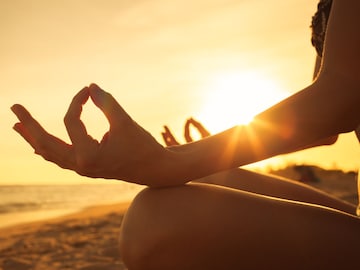Source :NEWS18 NEWS
Last Updated:January 11, 2025, 09:11 IST
You may be used to following ‘Parampara, Pratishtha, Anushasan’ — Tradition, Prestige, Discipline — in your normal life but when you come to Yoga, relax
The ancient Yogis chose poses that would provide strength, stability and proper distribution of energy. (Getty)
“Please leave your footwear and your ego outside”, reads a small board on the door of a Yoga therapy room in one of the well-known Yoga retreats in India. What is not mentioned but is nevertheless emphasised by the therapist and doctor-in-charge is that one is supposed to enter the room leaving behind even the attitude of doing Yoga “perfectly”.
At the retreat, though discipline and perseverance are encouraged, getting stressed about “making no omissions” is a strict no-no. To those who get obsessed with the schedule, the doctors have this to say: “This is Yoga, relax!”
related stories
WHAT MAKES YOGA ASANAS DIFFERENT FROM OTHER EXERCISE?
When Mansi* was diagnosed with clinical depression, she started taking medication and also began therapy. Lows nevertheless still hit her, at which point she would be asked to take double the dose of her medicines. She tried changing cities and starting a new life. She was able to hang in there, but just about, and each day was erratic. This was till someone suggested doing a short Yoga course.
Mansi finally decided to try it out, and within a month, her life began changing for the better. The cumulative effects lasted well over six months, even though she had become lax in following the schedule at home. After a year, however, she began losing herself.
When a well-wisher suggested doing some form of physical exercise, Mansi was jolted out of her inertia. She remembered how Yoga had improved not just her mood, but also physical symptoms and aberrations like wild food cravings. Soon, she went back to the same Yoga retreat for a “refresher’s course” of sorts.
Yoga is not merely another form of physical exercise, and this is because the poses and movements have a different end goal and purpose: they bring physical fitness alright, but they also steady the mind to make it fit for concentration and meditation. Physical benefits are just one aspect of Yoga on the course to becoming a calmer person.
WHY IS YOGA RELAXING?
While doing the Asanas, it is emphasised that there must be slowness, awareness, and mindfulness; also, the movements are coordinated with slow and rhythmic breathing. Added to this, one is supposed to observe the changes and effects of the movement on the body during the pauses between rounds. Yoga asanas are therefore an exercise in going inward, in toto.
In contrast, other forms of physical exercise focus on strength, stamina, and endurance. The motivation here—whether overt or subtle—is ambition, competitiveness, and sometimes the “demonstration effect”. All of these make the process “extroverted” and this very premise precludes relaxation from happening.
The ancient Yogis chose poses that would provide strength, stability and proper distribution of energy. But more than that was their effect on the nervous system and the endocrine system. Yoga asanas are able to activate the sympathetic nervous system as well as the parasympathetic nervous system, depending on the specific pose.
No energy is lost, and instead, it is conserved, built and distributed properly. The deep breathing enables higher oxygen levels reaching all systems via increased circulation.
ERGO, YOGA PRACTICES ARE DONE DIFFERENTLY
For instance, Yoga cannot be done along with music. No, even “calming music” is a distraction—unless the music is being used for enabling detachment. This is because, first, music diverts attention from body awareness, and this holds true when performing postures as well as relaxation techniques. Second, the rhythm of the music interferes with the breathing rhythm that one is supposed to follow in each pose. This interference prevents deep relaxation.
Besides the use of music, Yoga authorities ask us to keep in mind the following factors when doing Yoga.
Yoga movements are non-repetitive and non-fatiguing:
Repeated movements are redundant because building muscles is not the chief goal here. The purpose, rather, is to ensure good health for the muscles, for the internal organs, and for the nerves and mind. According to Yoga scholar and Guru Dr Jayadeva Yogendra, “Yoga practices are directed towards the health of the overall system. Repeated muscular movements cause much waste especially of the muscular tissue, while their hygiene effects fail to produce such profound reactions as are favourable to the internal organs.”**
Often-repeated movements increase nervous agitation involving the cortex which, in turn, affects the mind, he adds. Not just that, if breathing is quick and jerky, it has an impact on the lung structure and capacity. Repeated movements can also cause atherosclerosis, reportedly.
Poise and stability are the characteristics of Yoga poses. Because strain is avoided during practice, no fatigue and exhaustion are felt at any point.
Carefully select the space, accessories and apparel:
• The space chosen should be well ventilated and free from wind.
• Keep the mouth closed. Breathing should be done through the nose, unless specified for particular conditions.
• Clothes should be loose fitting and comfortable such that movement is free but also the body feels the air on it. Natural fibres like cotton and linen that allow easy breathing are to be preferred.
• Never perform Yoga on the bare floor; use a Yoga mat of any material.
• The feet though, should be bare; do not use footwear while doing Yoga, so that the nerve-endings can sense and enable balance and exercise in the lower parts.
*Name changed to protect privacy
**CYCLOPAEDIA YOGA Vol I – With Special Information on Asana; ed. Dr Jayadeva Yogendra, The Yoga Institute, Santacruz, Mumbai (1988, first edition)
The author is a journalist, a cancer-warrior since 19 years, and a certified yoga teacher. She can be reached at swatikamal@gmail.com
SOURCE : NEWS 18








